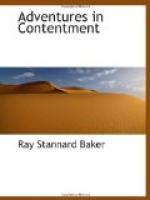I was ashamed. Deep shame covered me. How little of the earth, after all, I said, lies within the limits of my fences. And I looked out upon the perfect beauty of the world around me, and I saw how little excited it was, how placid, how undemanding.
I had come here to be free and already this farm, which I thought of so fondly as my possession, was coming to possess me. Ownership is an appetite like hunger or thirst, and as we may eat to gluttony and drink to drunkenness so we may possess to avarice. How many men have I seen who, though they regard themselves as models of temperance, wear the marks of unbridled indulgence of the passion of possession, and how like gluttony or licentiousness it sets its sure sign upon their faces.
I said to myself, Why should any man fence himself in? And why hope to enlarge one’s world by the creeping acquisition of a few acres to his farm? I thought of the old scientist, who, laying his hand upon the grass, remarked: “Everything under my hand is a miracle”—forgetting that everything outside was also a miracle.
[Illustration: “How graceful climb these shadows on my hill”]
As I stood there I glanced across the broad valley wherein lies the most of my farm, to a field of buckwheat which belongs to Horace. For an instant it gave me the illusion of a hill on fire: for the late sun shone full on the thick ripe stalks of the buckwheat, giving forth an abundant red glory that blessed the eye. Horace had been proud of his crop, smacking his lips at the prospect of winter pancakes, and here I was entering his field and taking without hindrance another crop, a crop gathered not with hands nor stored in granaries: a wonderful crop, which, once gathered, may long be fed upon and yet remain unconsumed.
So I looked across the countryside; a group of elms here, a tufted hilltop there, the smooth verdure of pastures, the rich brown of new-plowed fields—and the odours, and the sounds of the country—all cropped by me. How little the fences keep me out: I do not regard titles, nor consider boundaries. I enter either by day or by night, but not secretly. Taking my fill, I leave as much as I find.
And thus standing upon the highest hill in my upper pasture, I thought of the quoted saying of a certain old abbot of the middle ages—“He that is a true monk considers nothing as belonging to him except a lyre.”
What finer spirit? Who shall step forth freer than he who goes with nothing save his lyre? He shall sing as he goes: he shall not be held down nor fenced in.
With a lifting of the soul I thought of that old abbot, how smooth his brow, how catholic his interest, how serene his outlook, how free his friendships, how unlimited his whole life. Nothing but a lyre!
So I made a covenant there with myself. I said: “I shall use, not be used. I do not limit myself here. I shall not allow possessions to come between me and my life or my friends.”




